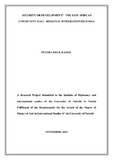| dc.description.abstract | Community. To this extent the study employs a constructivist approach to respond to three questions: Why despite the obvious threats in the region and the provisions made in the articles 5,123,124 and 125 of the EAC treaty, have the partner states failed to develop a common security strategy? To what extent does the absence of a common security strategy impede the intensification of the integration process? How can the states in the region evolve a common security policy? The study employed a qualitative research and its target population was the EAC Secretariat in Arusha and the Ministries responsible for the coordination of the EAC affairs in the five Partner States. Data was collected using a structured interview schedule. The study argues that the key impediments to the formulation of a functional regional security strategy are embedded in the state actors‟ state-centric perception of security and certain provisions of the treaty establishing the EAC. The actor‟s continued pursuit of national interests and sovereignty has rendered it difficult for the region to conceive common regional security threats as national interests. The study also argues that the absence of a regional security strategy has denied the region a coordination mechanism to steer the integration process. As a result, most of the objectives of the integration process have not been attained as envisioned. The study found out that the nexus between integration and security has not taken root in the region. The EAC still regards economic development and security as separate entities hence its preference for a gradualist regionalism approach to an integrated one. The study also found out that the mistrusts and suspicions that led to the break-up of the EAC in 1977 still linger in the region. These suspicions have derailed the fast tracking of Political Federation in which the region‟s security framework is anchored.
The study proffers a security framework that encompasses human security. The approach should address the military, political, economic, societal and environmental threats. For the purpose of formulating a Regional Security Strategy, the study categorizes the common interests of the region as: survival, vital, major and peripheral. To address the region‟s security adequately, the study recommends the prioritization of political integration in order to facilitate establishment of regional instruments that promote peaceful management of conflicts and stability. To address the challenge of sovereignty, the study recommends the immediate operationalisation of Article 8 (4 & 5) of the Treaty, which gives precedence to regional laws, policies and institutions over national, laws, lest the Partner States renege on their commitments or selectively implement them. The study also recommends a new institutional coordination framework that is sensitive to the regional political and security peculiarities. | en_US |

